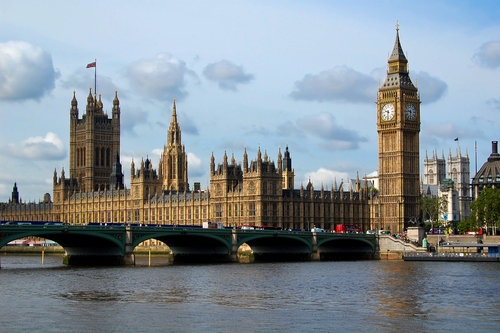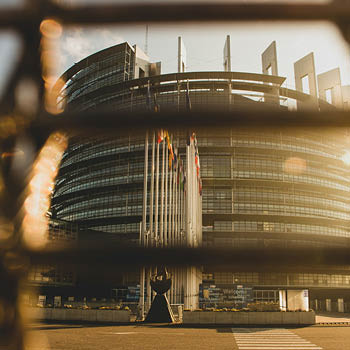77 Days to the UK General Election: The View From Westminster
Every General Election claims that it is the most important, the one that will have lasting implications in our lifetimes and beyond. This election is no different. All parties state that this election is the most crucial one of a generation – and for once, this may not be just hyperbole. The results of the 2015 election could have huge ramifications for the UK, and of course, the EU as a whole.
In practice, any Conservative-led Government would have to deliver a referendum on Europe – because, regardless of the coalition partner, Conservative MPs would not tolerate any coalition deal which would not deliver this. The Liberal Democrats, the main prospective coalition partner for the Conservatives, are likely to concede this in return for sustainable constitutional reform, despite being the most pro-European of the mainstream UK parties. By contrast, the Labour Party has come out hard against any EU Referendum – and are pushing this as their defining offer to business. However, although the Labour Party does not offer the same short-term uncertainty, the rise of the Scottish National Party (SNP) poses real risks. In the event that Miliband is forced todo a deal with the SNP, the structural integrity of the UK, further down the line, might be undermined.
One thing that makes the election so unpredictable is the role of the smaller parties in eroding the voter bases of both the Conservatives and Labour. Due to an inbuilt electoral bias, and the decline in their vote to the point where they are effectively an England-only party, the Conservatives have almost no chance of forming a majority by themselves at the next election. However, although this means that it is far easier for Labour to get the seats needed to form a Government, their poll ratings have also collapsed over the last 18 months. Recent poll ratings have put the Conservatives and Labour neck-and-neck, with average polling of around 32% each.
Indeed, the collapse of Labour’s poll ratings has not directly benefited the Conservatives. Instead, Labour’s poor showing appears to be correlated to increased competition from the Scottish National Party in Scotland, and UKIP and the Green Party in England. In turn, the Conservatives also have to deal with a threat from UKIP. With UKIP polling at up to 15%, this disproportionately impacts the Conservatives’ support. This has forced both parties to scramble into designing strategies to appeal to their core support.
Labour’s intention is to focus on Conservative cuts to public services and the perceived risk to the health service in particular; while the Conservatives are hoping to keep the debate focused on deficit reduction and economic competence, an area where Labour still lags significantly behind. By being forced to defend its economic competence by conceding that it will make spending cuts to aim for a balanced budget, Labour risks exposing its left flank, with votes being defected to left-wing, anti-austerity parties including the Greens, SNP, Welsh nationalists, and even to a degree, UKIP. On the other hand, if the Conservatives are seen as too much of a gamble on the public services front, their support risks leeching to the Liberal Democrats, UKIP or even Labour – a scenario which would likely deliver Miliband into Downing Street.
The rise of UKIP has consumed much media attention. UKIP are targeting around 10 seats, with internal expectations of taking up to five. Their effect will be felt across the political spectrum, taking a significant number of votes off the Conservatives in the South, votes off Labour in the North and even impact the Liberal Democrats in the South West. While they may well garner the third largest vote share, they are unlikely to yield sufficient seats to feature in any post-election coalition. Quixotically, their chief impact on the election may be to make a Labour-led Government more likely, by depriving the Conservatives, in particular, of support. The Tories are likely to adopt two, slightly contradictory, responses to this. The first will be to downplay Europe as an issue – because their message is never going to be as potent as UKIP’s – and to argue, if asked, that only a vote for the Conservatives will deliver a referendum. They are also expected to try to reinforce their message on this by offering the prospect of a referendum sooner than 2017, in an effort to neutralise the impact of any prolonged uncertainty. This is something for which some business groups – notably the British Chamber of Commerce – has also recently called for.
The likelihood that the Conservatives will get the chance to implement this rests in part on the performance of the Labour Party. Labour has a crumbling vote share, the most left-wing offering since 1992, and a leader widely considered to be unsuitable to be Prime Minister. Current polls suggest Labour is facing a wipe-out in Scotland, with the SNP poised to take the vast majority of Scotland’s 59 seats. If Labour’s campaign collapses in England, it is possible that the UK faces either a Conservative-led Government offering an immediate referendum on Europe or alternatively, a Labour Party Government propped out by Scottish Nationalists, to whom they will have been forced to offer concessions that threaten the medium-term integrity of the United Kingdom.
James Dowling
Director, Public Affairs and Corporate Communications
Find Out More
-
The EU year of change: Act 2
June 13, 2024


